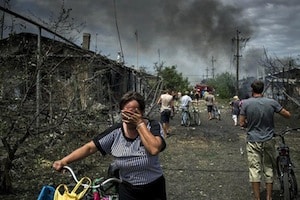MEMORANDUM FOR: The President
FROM: Veteran Intelligence Professionals for Sanity (VIPS)
SUBJECT: Avoiding War in Ukraine
Dear President Biden,
We last communicated with you on December 20, 2020, when you were President-elect.
At that time, we alerted you to the dangers inherent in formulating a policy toward Russia built on a foundation of Russia-bashing. While we continue to support the analysis contained in that memorandum, this new memo serves a far more pressing purpose. We wish to draw your attention to the dangerous situation that exists in Ukraine today, where there is growing risk of war unless you take steps to forestall such a conflict.
At this juncture, we call to mind two basic realities that need particular emphasis amid growing tension between Ukraine and Russia.
First, since Ukraine is not a member of NATO, Article 5 of the NATO Treaty of course would not apply in the case of an armed conflict between Ukraine and Russia.
Second, Ukraine’s current military flexing, if allowed to transition into actual military action, could lead to hostilities with Russia.
We think it crucial that your administration immediately seek to remove from the table, so to speak, any “solution” to the current impasse that has a military component. In short, there is, and can never be, a military solution to this problem.
Your interim national security strategy guidance indicated that your administration would “make smart and disciplined choices regarding our national defense and the responsible use of our military, while elevating diplomacy as our tool of first resort.” Right now is the perfect time to put these words into action for all to see.
We strongly believe:
1. It must be made clear to Ukrainian President Zelensky that there will be no military assistance from either the US or NATO if he does not restrain Ukrainian hawks itching to give Russia a bloody nose — hawks who may well expect the West to come to Ukraine’s aid in any conflict with Russia. (There must be no repeat of the fiasco of August 2008, when the Republic of Georgia initiated offensive military operations against South Ossetia in the mistaken belief that the US would come to its assistance if Russia responded militarily.)
2. We recommend that you quickly get back in touch with Zelensky and insist that Kiev halt its current military buildup in eastern Ukraine. Russian forces have been lining up at the border ready to react if Zelensky’s loose talk of war becomes more than bravado. Washington should also put on hold all military training activity involving US and NATO troops in the region. This would lessen the chance that Ukraine would misinterpret these training missions as a de facto sign of support for Ukrainian military operations to regain control of either the Donbas or Crimea.
3. It is equally imperative that the US engage in high-level diplomatic talks with Russia to reduce tensions in the region and de-escalate the current rush toward military conflict. Untangling the complex web of issues that currently burden US-Russia relations is a formidable task that will not be accomplished overnight. This would be an opportune time to work toward a joint goal of preventing armed hostilities in Ukraine and wider war.
There is opportunity as well as risk in the current friction over Ukraine. This crisis offers your administration the opportunity to elevate the moral authority of the United States in the eyes of the international community. Leading with diplomacy will greatly enhance the stature of America in the world.
For the Steering Group, Veteran Intelligence Professionals for Sanity
William Binney, former Technical Director, World Geopolitical & Military Analysis, NSA; co-founder, SIGINT Automation Research Center (ret.)
Marshall Carter-Tripp, Foreign Service Officer & former Division Director in the State Department Bureau of Intelligence and Research (ret.)
Bogdan Dzakovic, former Team Leader of Federal Air Marshals and Red Team, FAA Security (ret.) (associate VIPS)
Graham E. Fuller, Vice-Chair, National Intelligence Council (ret.)
Robert M. Furukawa, Captain, Civil Engineer Corps, USNR (ret.)
Philip Giraldi, CIA, Operations Officer (ret.)
Mike Gravel, former Adjutant, top secret control officer, Communications Intelligence Service; special agent of the Counter Intelligence Corps and former United States Senator
John Kiriakou, former CIA Counterterrorism Officer and former Senior Investigator, Senate Foreign Relations Committee
Karen Kwiatkowski, former Lt. Col., US Air Force (ret.), at Office of Secretary of Defense watching the manufacture of lies on Iraq, 2001-2003
Edward Loomis, NSA Cryptologic Computer Scientist (ret.)
Ray McGovern, former US Army infantry/intelligence officer & CIA presidential briefer (ret.)
Elizabeth Murray, former Deputy National Intelligence Officer for the Near East & CIA political analyst (ret.)
Pedro Israel Orta, CIA Operations Officer & Analyst; Inspector with IG for the Intelligence Community (ret.)
Todd E. Pierce, MAJ, US Army Judge Advocate (ret.)
Scott Ritter, former MAJ., USMC, former UN Weapon Inspector, Iraq
Coleen Rowley, FBI Special Agent and former Minneapolis Division Legal Counsel (ret.)
Kirk Wiebe, former Senior Analyst, SIGINT Automation Research Center, NSA
Sarah G. Wilton, CDR, USNR, (ret.); Defense Intelligence Agency (ret.)
Robert Wing, US Department of State, Foreign Service Officer (former) (associate VIPS)
Ann Wright, US Army Reserve Colonel (ret) and former US Diplomat who resigned in 2003 in opposition to the Iraq War


